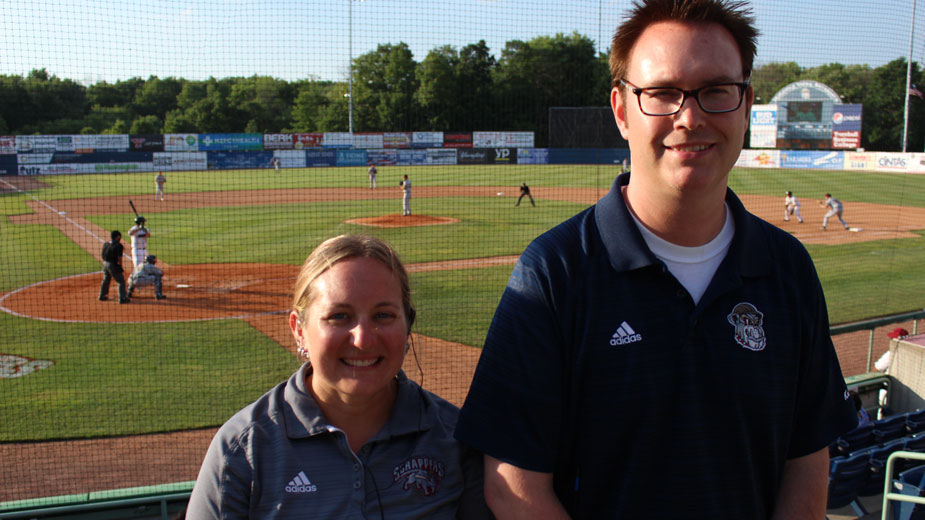Scrappers Field a Winning Brand for Fan Experience
By Jim Houck
NILES, Ohio — When Jordan Taylor evaluates his team’s performance after a game or season, he’s doesn’t think in terms of wins and losses.
“My mind is on the business end: the sponsors, ticket sales, what promotions are coming up and how we can make the fan experience something special,” he says.
Taylor is general manager of the Mahoning Valley Scrappers and vice president of HWS Baseball, the Massachusetts-based organization that owns the Niles-based team and three other minor league franchises. As such, he oversees the more than 200 employees needed to run the Mahoning Valley Scrappers organization during its three-month season.
The team is fortunate, he says, because it’s drawn a consistently strong and predictable attendance the last seven years despite its relatively small market compared to its peers in the New York Penn League. The average attendance this year, through July 24, is 3,001, seventh-best in the 14-team league.
The biggest factor that drives attendance, he says, is the weather.
“A winning team is a bonus, icing on the cake,” Taylor says. “What fans are really looking for is the experience factor, and it’s the same throughout minor league baseball as a whole.”
In 2015, 38.6 million fans attended a minor league baseball game, more than the total attendance for the NBA, NFL and NHL.
“We match up marketwise with teams that get about 1,000 per game, and we skew very high in terms of sponsorships,” Taylor says.
Corporate sponsorship dollars drive the largest percentage of team revenues, Taylor says, followed by concessions, ticket sales, merchandise, parking and non-Scrappers events at Eastwood Field.
“Our success with corporate partners really speaks to the community and to the brand we’ve created as a fun, affordable, family-entertainment option,” he says. “From Day One, they’ve embraced the franchise.”
One sponsor is WFMJ, which has been partnering with the Scrappers on fireworks, bobblehead and Scrappers Kids Club promotions since the first season in 1999.
“For us, the environment is great and it’s one of those things you can take the whole family to,” says WFMJ marketing director Jack Stevenson. “The Scrappers’ broad appeal is amazing. The team pulls from everywhere and it’s an ageless crowd – from kids to senior citizens.”
Families are largely the ones the Scrappers market to, and it’s not the Batavia Muckdogs or Brooklyn Cyclones whom the front office views as competitors, but other family entertainment options such as miniature golf, movie theaters and concerts.
“People have only so many entertainment dollars to spend, and we feel we offer something unique,” says Heather Sahli, Scrappers assistant general manager-marketing.
The Scrappers also rely heavily on social media marketing to engage with its fans and offer value-added exposure to corporate sponsors. The team has more than 10,000 followers on Facebook and another 6,200 on Twitter. It also has Instagram and Snapchat accounts.
“More and more of our marketing resources and ad spending has gone to social media because of the success we’ve seen with it,” Taylor says.
Photos of fans at the ballpark and news about former Scrappers making it to the major leagues are among the more engaging posts, he says.
While the Scrappers play only 38 home games per season, their economic impact goes beyond funding the team’s business operations.
“Visitors coming to a game at Eastwood Field aren’t the only form of income as a result of the team,” says Stephanie Sferra, executive director, Trumbull County Tourism Bureau. “The teams who come to play the Scrappers stay in area hotels, dine at local restaurants and may even go shopping during their off-hours.”
Local nonprofit organizations also benefit. In 2015, the Scrappers finished first in the league in charitable contributions at $312,072.
The Scrappers have a player development contract to serve as the Cleveland Indians’ short-season Class-A affiliate. Under that contract, the Indians cover players and coaches’ salaries, while the Scrappers are responsible for most of the day-to-day expenses, such as travel, meals and accommodations.
“A lot of people think the Indians own the team or pay for the bulk of the operations,” Taylor says, “but that’s not the case.”
He cites the stadium, employee payroll and promotional costs as the largest expenses.
On Taylor’s front-office staff are three assistant general managers, one each in charge of marketing, sales and stadium operations, and a handful of directors who manage group sales, accounting, the box office, grounds keeping and community relations.
From June to September, the employee roll swells with interns and staff for concessions, tickets, guest relations, parking and maintenance.
The season might last only a quarter of the year, but many front-office jobs are year-round and Taylor describes game days as grueling.
A typical game day for the staff starts at 8:30 a.m. and continues until an hour after the game, which can run until after 11 p.m.
“It can get pretty tough on back-to-back-to-back days on a six-day home stand,” Taylor says. “And while we’re running this year’s games, we’re already planning promotions for next year.”
Pictured: Managing the business side of the Mahoning Valley Scrappers is a year-round job, say assistant general manager Heather Sahli and general manager Jordan Taylor.
Copyright 2024 The Business Journal, Youngstown, Ohio.



